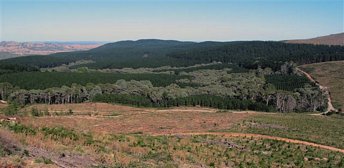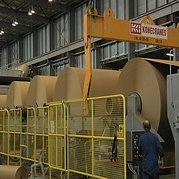The South West Slopes of NSW is one of the largest softwood plantations in Australia and Forests NSW owns and manages the majority of this resource.
 Privately-owned softwood plantations are of increasing importance and are becoming a greater proportion of the total plantation area.
Privately-owned softwood plantations are of increasing importance and are becoming a greater proportion of the total plantation area.
There is also significant hardwood processing in the region with a relatively static volume.
A growing confidence exists in the softwood timber industry as the volume of softwood production increases and Australia experiences an upturn due to the global demand for plantation products.
A long-term shortage of timber is emerging as more and more areas of native forest are set aside for conservation, while demand for wood and timber products continues to rise due to population growth and higher standards of living.
 In particular, the Pacific Rim faces a significant shortage of softwood during the next century, and this will result in increased demand for softwood plantation timber.
In particular, the Pacific Rim faces a significant shortage of softwood during the next century, and this will result in increased demand for softwood plantation timber.
This shortfall between supply and demand will challenge both growers and processors to provide a range of end products including mouldings, furniture, board products, pulp and paper.
Forestry generates economic growth and more jobs in regional Australia.
For example, towns in the South West Slopes and Central Tablelands of NSW with a strong timber industry, generally enjoy a higher rate of employment than the national average.
Read the Profile of the value of the timber industry in the South West Slopes Region of New South Wales, commissioned by the Department of State and Regional Development.
Commercial plantations also provide substantial benefits for farmers, such as an extra source of income, higher property values and a more sustainable farming enterprise.
